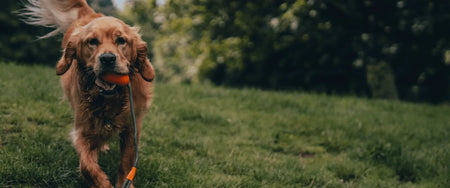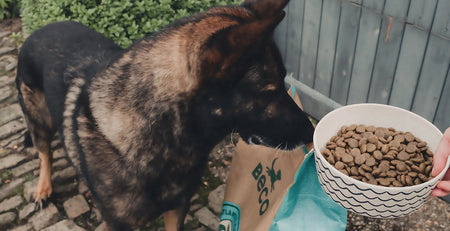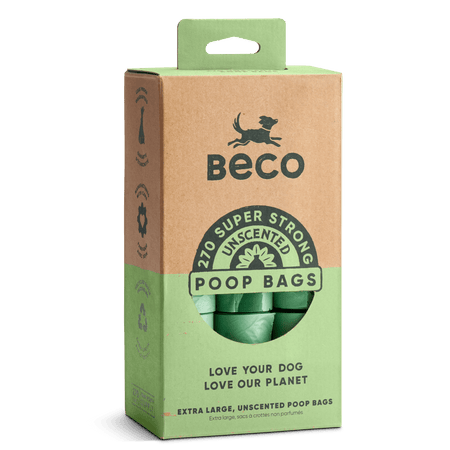Short answer: no, and that’s on purpose.
At Beco, we’ve chosen not to make our poop bags biodegradable. That’s because we’ve looked closely at what happens after a bag is used.
What sounds environmentally responsible on the label doesn’t always add up in real life.
Here’s why we’ve taken a different path.
- We avoid biodegradable bags because they need specific composting conditions that are rarely available.
- Most poop bags end up in landfills where biodegradables break down poorly or create microplastics.
- Recycled plastic bags work within existing waste systems without requiring special infrastructure.
The Problem With Biodegradable Bags
Biodegradable dog poop bags are often marketed as the greener choice. In theory, they’re designed to break down into natural elements like water, carbon dioxide, and biomass with the help of microbes.
But in practice? It’s not that straightforward.
For biodegradable bags to break down as intended, they need very specific conditions: moisture, oxygen, heat, and microbial activity. These conditions are typically found in industrial composting facilities – not in your average park bin, home compost, or landfill.
And unfortunately, the reality is that most dog poop bags (biodegradable or not) end up in landfill, where they break down extremely slowly (if at all). Even worse, some fragment into microplastics or release methane as they degrade anaerobically.
So while the label might look eco-friendly, the outcome often isn’t.
Aren’t Compostable Bags Better?
Some bags are labelled as compostable, which is a stricter certification than biodegradable.
They’re made to fully break down into non-toxic compost under controlled conditions – usually within 90 to 180 days in an industrial composting facility. That’s great in theory.
But dog waste adds a layer of complexity. It contains pathogens like E. coli and parasites, which means it needs to be composted separately from food and garden waste. Most home compost bins aren’t equipped to do this safely, and industrial facilities rarely accept pet waste.
So again, even compostable bags often end up in landfill where they lose most of their environmental benefit.
Why We Use Recycled Plastic Instead
We’ve chosen to focus on what’s realistically better for the environment – not just what sounds better. Our poop bags are made from post-consumer recycled plastic, which means:
-
We’re reusing plastic waste that already exists, reducing the demand for virgin plastic
-
They’re compatible with how waste is currently handled (general waste bins)
-
They’re thick, strong, and reliable for daily use
Instead of depending on composting infrastructure that isn’t widely available or accessible, our bags work within the system most people already use.
It’s a more responsible, lower-impact choice for most dog owners.
But Aren’t Biodegradable Bags Plastic-Free?
Some are, but many still contain fossil-fuel-derived materials like PBAT, which only partially degrade – and only under very specific conditions. Without proper breakdown, they can create microplastics or persist in the environment for years.
And those that are truly plastic-free still need the right conditions to degrade fully. If they don’t get them, they stick around like any other plastic.
Is Recycled Plastic Perfect?
No material is perfect. But when you consider:
-
where bags actually end up,
-
the lack of infrastructure for composting pet waste,
-
and the risks of misleading biodegradability claims,
...using recycled plastic starts to make a lot more sense.
It’s a practical step toward reducing waste and extending the life of existing materials, without adding confusion or creating unintended environmental consequences.
Frequently Asked Questions
Can Beco poop bags be recycled after use?
No. Once used, poop bags (regardless of material) should go in general waste due to contamination. Recycling facilities can’t process items containing organic waste like dog poo.
Do Beco bags contain any new (virgin) plastic?
No, our bags are made from 100% post-consumer recycled plastic. That means we’re giving existing plastic waste a second life instead of creating more.
How should I store Beco poop bags to make them last?
Store them in a cool, dry place out of direct sunlight. Excessive heat or humidity can weaken the material over time, even though it’s not biodegradable.
Are recycled plastic bags weaker than biodegradable ones?
Not at all. Beco bags are designed to be strong and leak-resistant without the brittleness some biodegradable alternatives are known for.
Conclusion
No, Beco poop bags aren’t biodegradable.
But they are made from recycled plastic, and that’s a conscious choice. It’s all about doing what’s realistic, responsible, and effective in the current waste system.
If you’re looking for a bag that holds up to daily use, helps reduce plastic waste, and doesn’t depend on composting conditions to deliver on its promise, give ours a try. We think you (and the planet) will be glad you did.










